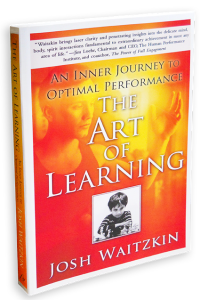 This article was originally published on May 2nd 2009.
This article was originally published on May 2nd 2009.
Josh Waitzkin became a world-class champion in two seemingly unrelated fields – chess (they even made a movie about him) and Push Hands Tai Chi. On the outside these may seem like totally different worlds, but both of them are activities that require high levels of internal control to be successful. And Josh became an expert in developing that mental and emotional control.
Josh uses The Art of Learning to examine the processes he used to develop mastery in these two fields. He follows a biographical time line to do so, but he’s really more concerned with the lessons he learned at each stage of his climb to mastery. While many of us don’t have the time, motivation, or intrinsic talents to be world-class chess players or martial artists, there are many ways that an improved understanding of how to learn new skills can help in our daily lives.
Big Thought
Developing the fundamental skills of learning is an important part of mastering any discipline. The degree to which individuals can view the learning process as a constant, step-by-step, gradual process is the degree to which they can attain the mastery that they are seeking.
Ideas, Implications, and Questions
- “I believe that one of the most critical factors in the transition to becoming a conscious high-performer is the degree to which your relationship to your pursuit stays in harmony with your unique disposition.” (pg 80) It’s interesting that the people at the top of their field always seem very comfortable with who they are – so is one step of achieving mastery in a skill achieving mastery of self? Josh says so and I agree.
- One of Josh’s basic paradigms that he consistently works from is the metaphor that life is a competition. The Art of Learning looks at two very simple (although not easy), conflict-oriented activities, chess and Push Hands Tai Chi. For me, this has been the main weakness of many who talk about peak performance – they almost always use the metaphor of life as conflict. I think a more valuable question is how to develop yourself without looking at everything as a struggle that must be won. How do you translate the lessons the lessons of conflict into useful tools for something that is variable and complex, for example, interpersonal relationships or developing a business?
- The idea of numbers to leave numbers is powerful (pg 74). The idea of immersing yourself in the fundamentals of an activity so as to integrate them into your subconscious is incredibly useful, and one that most people tend to fight. We want to be able to learn a new skill in a few hours – watch a video, read a book, go to a website – when it really takes time and practice (see the Rule of 10,000 in Outliers). The people that invest in learning the foundations to a new discipline are the most successful in the long-term.
- One of the most useful tools that Josh describes is the difference between entity and incremental learning (pg. 29–31). Figuring out which of the two paradigms of learning you follow can be really useful. He posits that incremental learning is more powerful because it allows learning to be a process instead of an event, and it’s one that I agree with. I’ve often seen people who are initially very successful at something become completely paralyzed when it gets too challenging. Conversely, those who understand learning a new skill takes time, and that mistakes are a part of the process, come out on top in the long run.
- Speaking of mistakes: “My response is that it is essential to have a liberating incremental approach that allows for times when you are not in a peak performance state.” (pg. 113) I’ve worked on this in my life because I grew up thinking mistakes were bad, but being an entrepreneur has taught me that making mistakes is a valuable and necessary part of the process. Ironically, the more I’ve become emotionally “OK” with mistakes and times where I’m not performing at a really high level, the more successful I’ve become.
- “Most of us are a complicated mix of greys.” (pg. 217). Life isn’t black and white, and neither are we. Amen.
Should you read this book?
Yes. I found that it really challenged my thinking on what it takes to be a top performer and develop mastery of a skill. I don’t think I agree with everything Josh wrote, but it speaks to his passion and skill that The Art of Learning made me contemplate my own views as much as it did.
